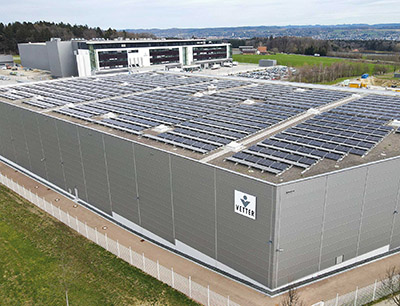
Vetter has been a member of the Science Based Targets Initiative (SBTi) since November 2023. The aim of the companies in the SBTi is to become climate-neutral by 2050. The initiative thus represents the strictest climate protection targets for companies worldwide. The pharmaceutical service provider has thus committed itself to the 1.5-degree target. To this end, the company has presented a sustainability strategy with specifically defined steps up to 2030. This strategy already takes into account the impact of the planned dynamic growth of the order development and manufacturing company on its carbon footprint. With the commissioning of the new photovoltaic system and the conversion of another existing combined heat and power plant to biogas at the Ravensburg site for optical inspection and logistics, Vetter is already taking important steps towards Net Zero in 2023.
As Senior Vice President Technical Service, Henryk Badack is responsible for global sustainability activities at Vetter. He is convinced: "Many measures that other companies are only now implementing, such as 100 percent green electricity, are already part of our daily routine. We invest continuously to make energy-intensive production processes more efficient and to gradually switch to climate-friendly forms of energy. Joining the SBTi is therefore the logical next step for us: we are making it even more transparent for our customers and partners that we want to achieve Net Zero and how we intend to do it.”
By joining the SBTi, the company is not only committing to ambitious climate targets: Another key element is the implementation of uniform monitoring and reporting standards for CO2-relevant processes in accordance with the requirements of the international Green House Gas (GHG) Protocol. The pharmaceutical service provider has already recorded some of its Scope 3 emissions for the current sustainability report and reported the CO2 balance in accordance with the GHG protocol. Henryk Badack comments: "By joining SBTi, we commit ourselves to annual reporting and their validation. In this way, we make our measures to reduce our carbon footprint even more transparent and traceable while contributing to fully sustainable supply chains."
Pharmaceutical production is energy-intensive. The switch to renewable energies is correspondingly complex. The company has been investing in the development and expansion of local infrastructure for sustainable energy generation for years. In 2023, the company invested a good one million euros in the installation of a large photovoltaic system on the roofs of the state-of-the-art materials warehouse in Ravensburg and a six-figure euro sum in the conversion of a natural gas cogeneration plant at the same site. Recently, only biogas has been used here. The PV system will generate around 700,000 kilowatt hours per year. This corresponds to around ten percent of the site's energy consumption. This saves Vetter around 330 tons of CO2 per year. The conversion to biogas will save around 1,000 tons of CO2 per year.
Vetter plays a leading role among CDMOs worldwide in the area of sustainability. The company was recently awarded Platinum status in the globally recognized Ecovadis ranking, placing it in the top one percent of the most sustainable companies. The decisive factor for the improvement from Gold to Platinum status was the further development of the company's sustainable supply chain initiatives, from supplier assessment measures to environmental and human rights risk analyses. Vetter's role as an active member of the UN Global Compact and its continuous sustainability reporting also contributed to the excellent rating.
The Science Based Targets Initiative is a global organization that enables companies to set ambitious climate targets. These are based on the latest findings of climate research. The initiative focuses on getting companies worldwide on the path to halving their emissions by 2030 and becoming climate-neutral by 2050. SBTi is a joint initiative of the Carbon Disclosure Project (CDP), the United Nations Global Compact, the World Resources Institute (WRI) and the Worldwide Fund for Nature (WWF).